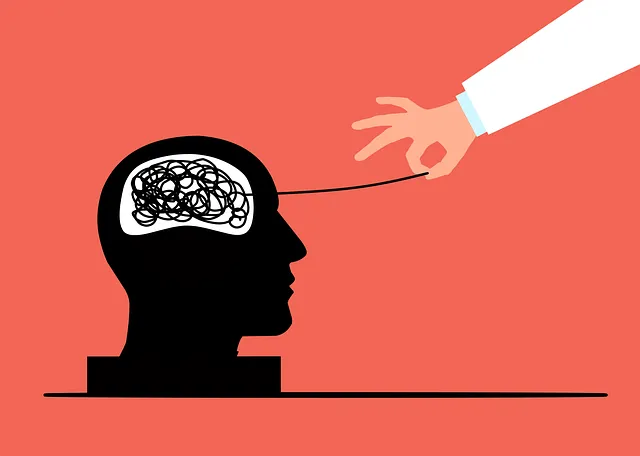Denver Kaiser Permanente mental health services prioritize creating safe, inclusive environments through active listening and non-judgmental attitudes. They use evidence-based practices like self-awareness exercises and mental health education to foster open communication, build camaraderie, and support personal growth. By incorporating interactive activities, cultural competency training, and community outreach, they enhance therapeutic outcomes and promote collective healing for diverse populations.
Mental wellness group facilitation is a powerful tool for enhancing collective well-being. This article explores effective techniques used by Denver Kaiser Permanente’s mental health services, focusing on group dynamics, engagement strategies, and creating safe spaces. We delve into how these methods foster open communication, build trust, and promote inclusivity within therapeutic settings. By understanding these approaches, facilitators can revolutionize mental health support in their communities.
- Understanding Group Dynamics for Effective Facilitation
- Denver Kaiser Permanente's Approach to Mental Health Groups
- Engaging Participants: Techniques for Active Engagement
- Creating a Safe Space: Building Trust and Inclusivity
- Facilitating Open Communication: Strategies for Encouraging Transparency
Understanding Group Dynamics for Effective Facilitation

Understanding group dynamics is a cornerstone for effective facilitation within mental wellness settings, such as those offered by Denver Kaiser Permanente. When facilitating groups, it’s crucial to recognize that individuals bring unique experiences, perspectives, and emotional states. Effective facilitators create a safe, inclusive environment where every participant feels valued and heard. This involves active listening, non-judgmental attitudes, and the ability to navigate sensitive topics with grace.
Group facilitation techniques, such as those employed in the Mental Wellness Podcast Series Production or Stress Management Workshops Organization, aim to foster open communication, build camaraderie, and promote self-awareness exercises. By understanding group stages—from formation to dissolution—facilitators can adapt their approach, ensuring every member contributes and grows. Encouraging active participation while also allowing for quiet reflection helps create a dynamic that supports personal growth and collective healing, as evidenced in various self-Awareness Exercises and mental wellness research.
Denver Kaiser Permanente's Approach to Mental Health Groups

Denver Kaiser Permanente stands out for its innovative approach to mental health group facilitation. They prioritize creating a supportive and inclusive environment, fostering open dialogue, and encouraging active participation among members. Their mental health services are meticulously designed to cater to diverse needs, focusing not just on symptom reduction but also on self-esteem improvement and overall well-being.
The organization incorporates evidence-based practices like mental health education programs tailored to various populations and compassion cultivation practices to promote understanding, empathy, and connection among group members. By integrating these techniques, Denver Kaiser Permanente facilitates meaningful interactions, enhances therapeutic outcomes, and empowers individuals to navigate their mental health journeys with greater resilience and support.
Engaging Participants: Techniques for Active Engagement

In facilitating mental wellness groups, actively engaging participants from the outset is key to fostering a supportive and therapeutic environment, mirroring the comprehensive approach offered by Denver Kaiser Permanente mental health services. Icebreakers and interactive activities can help participants feel more comfortable and encourage open communication. Techniques like asking for personal experiences related to the topic, using anonymous question formats, or incorporating group exercises that promote active listening and empathy can greatly enhance participation.
These strategies not only stimulate Mental Health Awareness but also offer effective Anxiety Relief techniques. By creating a safe space where individuals feel validated and heard, facilitators enable deeper discussions and facilitate mutual learning, ultimately enhancing the overall effectiveness of the group session.
Creating a Safe Space: Building Trust and Inclusivity

Creating a safe space is paramount when facilitating mental wellness groups. This involves cultivating an environment where every participant feels seen, heard, and valued, regardless of their background or experiences. At Denver Kaiser Permanente mental health services, we prioritize building trust through open communication channels and active listening. This ensures that individuals feel comfortable sharing their thoughts and feelings without fear of judgment or stigma.
Inclusivity is another critical aspect of safe space creation. Our facilitators are trained to incorporate cultural competency training into group sessions, recognizing the diverse needs and perspectives within the room. By embracing mental health awareness and fostering an inclusive atmosphere, we enable every member to contribute meaningfully, promoting a sense of belonging and collective support. This technique not only enhances the therapeutic benefits but also ensures that our healthcare provider’s approach resonates with individuals from various cultural backgrounds.
Facilitating Open Communication: Strategies for Encouraging Transparency

Encouraging open communication is a cornerstone of effective mental wellness group facilitation. Creating a safe and non-judgmental space where participants feel comfortable expressing their thoughts and emotions is key. Techniques like active listening, reflective summarizing, and normalizing diverse experiences can foster transparency. For instance, facilitators in Denver Kaiser Permanente mental health services often employ these strategies to build trust within the group dynamic, promoting a deeper exploration of challenges and successes.
Community Outreach Program Implementation plays a vital role in expanding access to such support networks, while Healthcare Provider Cultural Competency Training ensures that facilitators themselves are equipped to address diverse cultural needs. Additionally, Mental Health Policy Analysis and Advocacy can inform and enhance facilitation by bringing awareness to systemic barriers and opportunities for improvement, further enriching the communication and connection within mental wellness groups.
Group facilitation techniques are pivotal in enhancing mental wellness, as exemplified by Denver Kaiser Permanente’s successful implementation. By understanding group dynamics, engaging participants actively, creating safe spaces, and fostering open communication, facilitators can revolutionize mental health support. The strategies outlined in this article, informed by Denver Kaiser Permanente’s approach, offer a roadmap for professionals aiming to provide inclusive, effective, and transformative mental health services.






